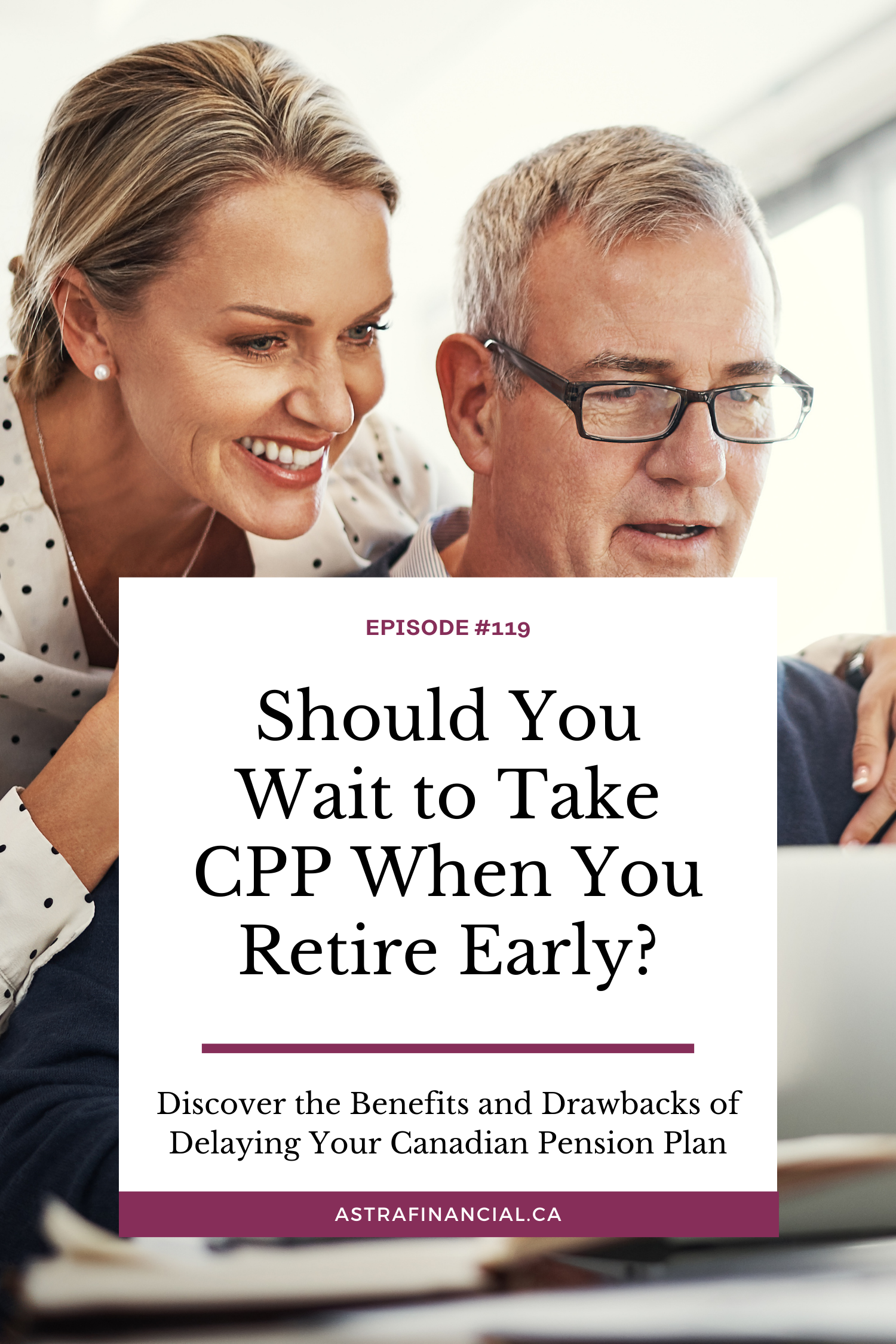Should You Wait to Take CPP When You Retire Early?

Are you planning for retirement and unsure about when to start taking your Canadian Pension Plan (CPP) benefits? Don’t miss this crucial episode of the Heart of Your Money podcast!
In episode 119, we delve into the intricacies of the CPP, a hot topic in almost every retirement meeting. Discover how your contributions and benefits are calculated, and learn about the often-misunderstood impact of zero years of working before collecting CPP.
Whether you’re nearing retirement or planning ahead, this episode will help you navigate the complexities of the CPP and optimize your retirement strategy.
Show Notes:
Hey there, welcome back to the Heart of Your Money podcast. This is episode 119. Today, I’m going to talk about CPP, the Canadian Pension Plan. This is becoming a very hot topic. Almost every retirement meeting we cover includes this discussion. So, I thought I’d share a little bit with you today. I’ll explain what the CPP is and how contributions and benefits are calculated.
I’ll also talk a little bit about those zero years of working before collecting CPP because that has been the number one conversation in our office—the impact of retiring a little bit earlier, not having any income, and then waiting to take CPP. What is the effect of that? We’ll also discuss life expectancy with the decision to delay CPP benefits.
This is a really interesting conversation because someone circled on a graph, “Okay, but if I only live to here, is it worth it?” And I’m like, “But you’ve got to plan to live longer.” So, I’m going to talk a little bit about that. So, diving in, here we go. Canadian Pension Plan. Please, your eyes don’t roll back in your head. For some people, this is really boring stuff, but it becomes super important when planning for retirement. The number one question is, when should I take it? Should I delay it? And what about not working up until age 65 before it starts? So, I’m going to start with how the contributions work.
You’re going to see off your pay stub while you’re working, your employee and your employer—so you, the employee, contribute a portion, and then your employer contributes a portion. For young people, they feel like it’s a huge amount off their paycheck. For the rest of us, we kind of shrug and roll our eyes a bit. It’s a pain in the butt, but we’ve been seeing it our whole life. Now we’re seeing a little bit more come off our pay. It’s 5.95 percent for employees, and then your employer matches it, totaling almost 12%. It totals 11.9%, so you’re seeing quite a bit more hit off your paycheck.
The beauty of it though, is that you get it, and it’s a life annuity paid for the rest of your life. It’s indexed with inflation, meaning that as inflation goes up, they have something called the CPI, Consumer Price Index, and they actually give you a raise. So that’s the beauty of it. It’s almost like a defined benefit pension from the government. There is a max amount that you get each year, and it’s a calculation based on your wages and length of time. So over the number of years, it’s a calculation of when you start taking it.
CRA has all of that information. You can go to the CRA website and request to see where your CPP contributions are at. For 2024, you have to make at least $66,600 to max your CPP contributions. If you make under that, you’re not quite putting in the full amount. You still get it back, but you won’t get the full amount. It’s paid out to you as early as age 60. You can start taking your Canadian Pension Plan early, but you’re going to receive lower payments over a longer period. You can also delay it. The normal age is 65 without any reductions.
If you wait until, let’s say, 66, 67, or 70, you’re going to get a bigger bang for your buck, and you’ll get a kind of bonus for delaying it. If you take it early, before age 65, the reduction rate is 0.6 percent for each month before your 65th birthday. That’s quite a bit, and it’s all determined by the penalty or the bonus that CPP will calculate how much you get and also your contributions over the years.
You actually get a bigger bonus the longer you wait, and that’s been a hot topic right now. We’re doing a lot of plans, and each individual plan is completely different. For some people, it’s best to wait until age 70 to take it because they’re going to get way more in their pocket, and they’re in great health—they’re going to live a long time. If you wait until age 70, you’re going to get a 42 percent increase in your benefit. I think that’s pretty awesome. If you take it early, at age 60, you’re going to get a 36 percent reduction. That’s why we’re pushing people, if possible, to wait until at least 65 to take it. We’re living longer. I remember when National Geographic had a picture of a baby, and this was probably 15 to 20 years ago, and it said, “This baby’s going to live to 100.” We’re living longer, so having that defined benefit pension-type CPP with indexing for inflation is going to be huge. It’s going to be a decision-maker for some people, for sure.
One of the big questions I get asked is the break-even analysis. In deciding whether you should take your CPP early or delay it, a lot of people want to know if they take it too soon, when will they get it back, or if they wait too long, how long do they have to live to get all their money back out of CPP because we don’t want to leave it in the pot. There is a break-even analysis, and it’s calculated as the age at which the total amount received from delaying the benefits equals the total amount received by taking them early. In general, the break-even point is typically around age 82. If you live beyond this age, delaying benefits usually results in receiving more total money over your lifetime.
So, if you think you’re going to live past age 82, delay your benefits as long as you can. Most of us are going to live until age 82, which is why we recommend delaying those benefits. However, we know there are considerations like your current health, lifestyle, and family history of longevity. Delaying is likely the best bet if you’re going to live past age 82. Sometimes people take it early to cover expenses, and the math makes sense—that’s one way. If you’re definitely working, you do not want to take CPP. If you’re working past age 65, delay it—you’ll get more bang for your buck.
Coming back to the question, let’s say you retire early at 58 or 59, and you do not want to take CPP until age 65, which is often the recommendation, and you’ve got enough money to fill the gap in between—that’s part of the whole planning process. The question is, what is going to happen to your CPP benefits with these years of no contributions? The formula works based on your years of contributions and your salary or income, defining if you get 100 percent or not. I’ll share an example to help explain this.
If a person earned $75,000 a year for the last 20 years and retires at age 60, then waits until age 65 to take CPP benefits, they’re saying, “I’m not going to take it. I’m going to wait, but now I don’t have any employment income. I’m not adding into CPP off my paycheck because I’ve retired.” What is the effect on CPP, meaning there are five years of no contributions before they take it? This is a common question in our office when we make these plans. People worry about being penalized for not working.
Let me do a quick, easy benefit calculation here for you. Because of the dropout provision, it excludes certain low-earning periods from the CPP calculation. There is a provision that allows you to exclude these years if you were someone who stayed home to raise children or had low-earning periods. The general dropout provision allows you to exclude up to 17 percent of your lowest-earning years, including periods of zero. So, if you retire at 60 and have worked all those previous years and now you’re waiting until 65, you can use this provision in the calculations.
In this example of retiring at 60 and waiting five years to take CPP, the general dropout provision calculation allows seven years of zero earnings. So, 60 to 65 is not a problem and will not reduce the CPP benefits in this case. This helps you maintain your CPP amount. If there were years before with no work, that would change the calculation.
It depends on your exact earnings history. If you got close to the maximum amount, in the example I mentioned, $75,000 a year exceeds the minimum contribution amount required to maximize your CPP. In 2024, you have to make $66,600 to maximize the CPP and get the full 100 percent, which is around $1,300 a month gross for CPP.
Consult with your financial advisor and go to Service Canada for a personalized estimate based on your specific contributions. This will give you a clearer picture of your expected CPP benefits. Go to Service Canada and request your CPP benefits to confirm your amounts.
The number one question I get is, if you retire and have five or six years until you turn on the tap for CPP, what will that do to your CPP amount? Because of the dropout provision in the calculation, it probably will not affect you at all.
Any questions, give me an email. That’s all I wanted to share. This was a bit heavy with some math and numbers, but if you have any questions, email me at [email protected].




